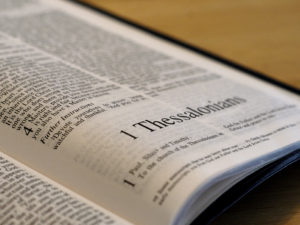Is the Trinity in 1 Thessalonians?
Is the Trinity in 1 Thessalonians? In the Bible book of 1 Thessalonians, are God and Jesus and spoken of as separate and distinct? Is the holy Spirit a person? Let’s examine these questions in some of the verses in 1 Thessalonians.

“In God the Father and the Lord Jesus Christ.” (1 Thessalonians 1:1) Here, God and Jesus are referred to as two separate and distinct individuals. Why are they not “in” the holy Spirit, if it is a person?
“Before our God and Father… inspired by hope in our Lord Jesus Christ.” (1 Thessalonians 1:3) God, the Father, is one person, and the Lord Jesus Christ is another person, entirely separate and distinct. No mention of the holy Spirit here.
“Beloved by God . . . also in power and in the Holy Spirit . . . you received the word with joy inspired by the Holy Spirit” (1 Thessalonians 1:4-6 NRSV). The holy Spirit is twice qualified by “the,” which is indicative of the fact that it is not a person. God uses the holy Spirit to ‘inspire’ “joy” in believers.
“They tell how you turned to God from idols to serve the living and true God and to wait for his Son from heaven, whom he raised from the dead – Jesus.” (1 Thessalonians 1:9-10) These verses are very instructive. Notice God is called “the living and true God,” while Jesus is called “his Son,” “whom he” [God] “raised from the dead.” Jesus “was dead” (Revelation 1:18). “God” was alive, because he “never dies” (Habakkuk 1:12 NJB), but had the power to bring him back to life.
“God’s churches in Judea, which are in Christ Jesus.” (1 Thessalonians 2:14) Both God and Jesus are mentioned separately, as entirely different individuals. Where is the holy Spirit, if it is a person?
“Who killed the Lord Jesus…. They displease God.” (1 Thessalonians 2:15) Both God and Jesus are mentioned here, but Jesus died. Jesus cannot be God since God cannot die. (Habakkuk 1:12)
“Who is our brother and co-worker in God’s service in spreading the gospel of Christ.” (1 Thessalonians 3:2) God and Jesus are mentioned separately again here, as distinctive individuals.
“Now may our God and Father himself and our Lord Jesus clear the way for us to come to you.” (1 Thessalonians 3:11) Once again, both are mentioned separately, as individuals, but the holy Spirit is conspicuously absent, which is strange, if it’s a person. This is another clue the holy Spirit is not a person.
“In the presence of our God and Father when our Lord Jesus comes.” (1 Thessalonians 3:13) Same point as above. Notice “God” is referred to as “the Father,” who is someone other than Jesus.
“Live in order to please God… and urge you in the Lord Jesus.” (1 Thessalonians 4:1) Both God and Jesus are mentioned here again as separate and distinct individuals .
“God, who gives [also] gives his holy Spirit to you” (1 Thessalonians 4:8 NAB). The holy Spirit is described as “his,” that is, God’s holy Spirit. This possession of God is, yet again, another indication that the holy Spirit is not person.
“We believe that Jesus died and rose again, and so we believe that God will bring with Jesus those who have fallen asleep in him.” (1 Thessalonians 4:14) God is obviously the one who is in control, and is entirely distinct from Jesus.
“God did not appoint us to suffer wrath but to receive salvation through our Lord Jesus Christ.” (1 Thessalonians 5:9) God is shown to be in total control, and he uses Jesus Christ to accomplish his purpose to help humans to gain salvation.
“Do not quench the Spirit” (1 Thessalonians 5:19). For the third time in 1 Thessalonians, the holy Spirit is qualified by “the,” indicating that it is not a person.
“May God himself, the God of peace, sanctify you through and through. May your whole spirit, soul and body be kept blameless at the coming of our Lord Jesus Christ.” (1 Thessalonians 5:23) God and Jesus are separate and distinct from each other.
Is the Trinity in 1 Thessalonians? No! As we can see from 1 Thessalonians, God and Jesus are two separate and distinct persons. Jesus was resurrected by God, because he was dead. The holy Spirit is not a person. These facts completely dismantle the Trinity.
All Bible verses from 1 Thessalonians quoted from the New International Version (NIV), unless otherwise stated.